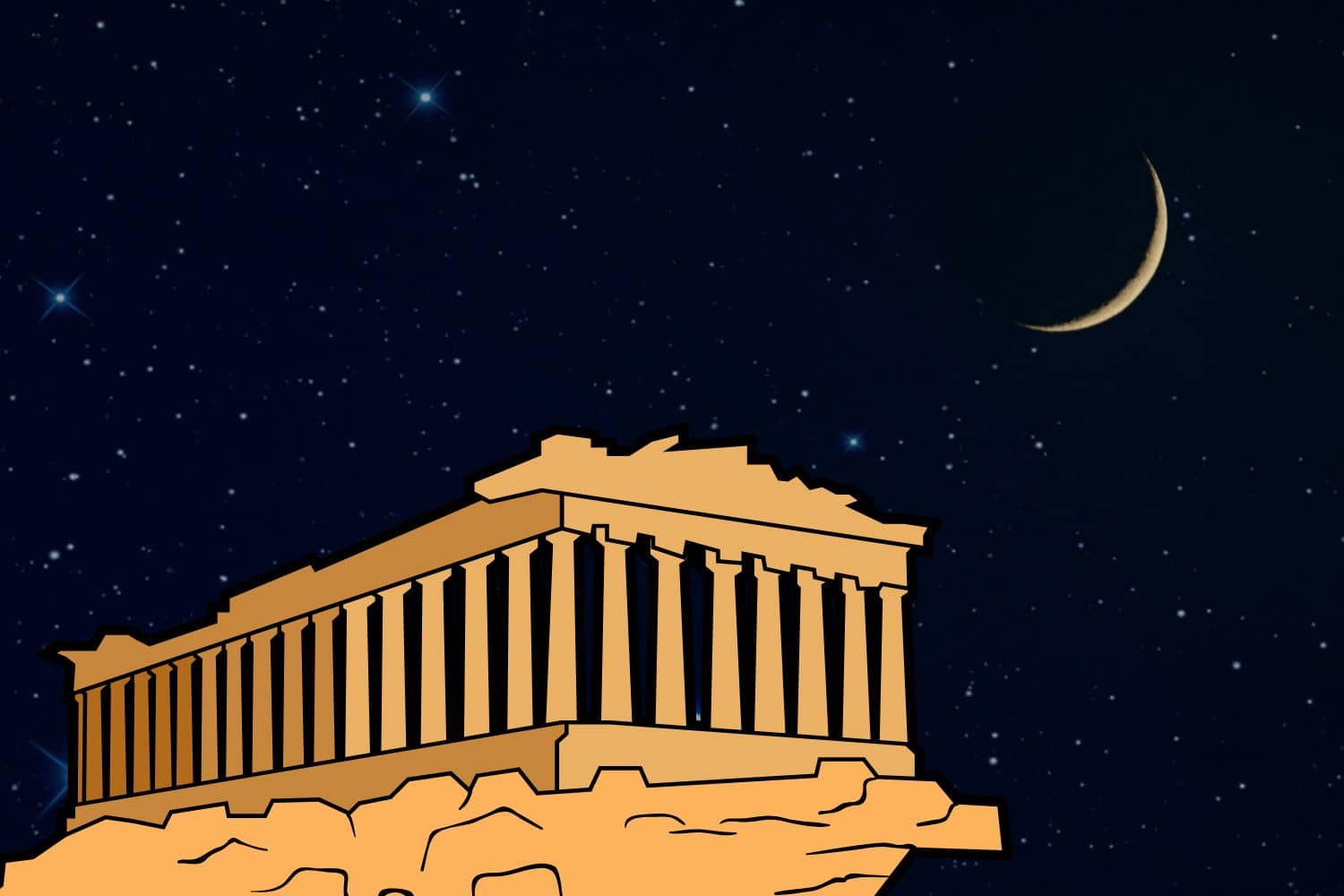Noumenia: How to Manifest on the New Moon like the Ancient Greeks
Your step-by-step guide to a modern ritual and the dates for 2024.

As an Amazon Associate we earn from qualifying purchases. This post may contain affiliate links from Amazon and other sites that we collect a share of sales from. You may learn more here.
In Ancient Greece, Noumenia (Νουμηνία) represented the first day of the lunar month in their calendar, as it is the first day of the visible New Moon. It falls on the day after the astronomical New Moon and on the first day that a sliver of the Waxing Crescent can be seen.
Noumenia was celebrated as an opportunity for beginnings and the day to offer humble gifts to chosen Gods and Goddesses, polish the home, freshen up altars, relax and feast, as there were no public meetings.
At the Acropolis in Ancient Athens, offerings were made to the city’s protector deities Athena Polias and Poseidon Erechthus, and to the guardian snake of the city.
Noumenia follows Hekate’s Deipnon, the day of the dark Moon. It is followed, by the second day of the lunar month, on which Greeks honored the Agathos Daimon (or “Good Spirit”), which protected or brought good luck to the family.
The lunar cycle was the basis of the Attic (Athenian) calendar and also held high spiritual importance to its citizens. Therefore, the New Moon, or Noumenia, was an important date to connect with the divine for the best chance for divine protection and to have their prayers answered for the month.
How to Do a Noumenia Ritual
It’s popular in modern spiritual practices to celebrate the New Moon, as it represents new beginnings.
The ancients felt the same with Noumenia’s celebration. Therefore, Noumenia marks the prime time to request blessings from the divine, bless one’s home, pray for solutions, and make spiritual space for the favors one desires.
There is no one-size-fits-all approach in celebrating. Even the ancients differed in how they would approach the start of lunar months. However, here is one guided ritual you can use.
1. Cleanse Yourself and Your Space
In order to make space for the desires that we yearn for, we need to clear out a space within ourselves so they have room to take up in the first place.
In order to symbolize this inner spiritual shift, tidy up and clean your home. You may burn cleansing herbs or resin to purify your environment. Use clean water to wash off your hands before entering your ritual space.
2. Ignite the Flame
The ancient Athenian citizens sought to find coziness and comfort around the hearth in their homes on Noumenia. While not everyone has a fireplace or bonfire, candles are usually accessible. After cleansing, light a flame.
Fire represents passion, warmth, and life force energy. Sit around your fire or candle and visualize your worries or blockages burning away and disintegrating into smoke in the air.
3. Give an Offering
Consider pouring out some honey or wine and setting this near the flame as an offering to give thanks. Based on the God or Goddess you are working with, you may give more specific offerings (read on for recommendations).
You may also speak some words to the gods if you choose to do so. Here are some sample hymns to consider.
4. Close the Space
When you feel spiritually satisfied, it’s time to close your energetic space. Give thanks to yourself and the divine for being present.
Visualize white light washing over you, granting you serenity, peace and protection. Extinguish the flame.

Noumenia Dates for 2024
Pinpointing the precise dates of Noumenia by aligning ancient calendars with modern times is tough. Differing lunar observations, variations in regional calendars, and the challenge of matching lunar cycles with our modern Gregorian calendar gets in the way.
While the dates will shift based on time zone, if you celebrate Noumenia on the first visible day of the New Moon that corresponds with its historical association as the visible start to the lunar month.
The dates of Noumenia for 2024 in the United States are:
- January 12, 2024
- February 10, 2024
- March 11, 2024
- April 9, 2024
- May 8, 2024
- June 7, 2024
- July 6, 2024
- August 5, 2024
- September 3, 2024
- October 3, 2024
- November 2, 2024
- December 1, 2024
- December 31, 2024
What Household Gods Are Honored During Noumenia?
On Noumenia, the Ancient Greeks gave offerings to connect with their gods and goddesses. Behind closed doors, family units worshiped separately from the collective Athenian society’s rituals. In our modern day, we can continue with our spiritual flexibility, reaching out to the deities we connect with most.
During Noumenia, it’s traditional to honor the household gods and goddesses. These include but are not limited to Hestia, Selene, Apollo, and Hera. One’s Agathos Daimon (or personal protective “Good Spirit”) is another viable option.
If you’d like to work with the divine but aren’t sure which deity, consider what guidance you may be seeking or where you’d like to express gratitude. You may choose one of the deities typically honored on Noumenia, or another ancient Greek god or goddess altogether. Choose a ritual or offering which suits your practice best.
1. Hestia
Hestia is the Greek goddess of the hearth and brings life and warmth into one’s home. She blesses her worshipers with domestic favor, fertility, success, and harmony within familial relationships.
Offerings to Hestia are the most common on this day and include lighting a flame, pouring libations, presenting home-cooked food, offering prayers, or burning incense to honor her role at the center of the residence.
2. Selene
Selene is the Greek goddess of the Moon and she is typically honored on Noumenia. She enjoys offerings or colors that symbolize the moon, libations like milk or honey, or white candles. Her support yields powerful personal reflections aligned with Noumenia, as the New Moon is in its beginning lunar phase.
3. Apollo
Apollo is the Greek God of the Sun and is also honored during this time. This is because during the night of Noumenia, the new moon illuminates the sky for the first time that month and it is the time when the Sun and Moon first conjunct or blend energies.
By honoring both lunar and solar energies, such as of Selene and Apollo, we may yield blessings to both our subconscious intuition and conscious perception. Apollo can be called upon with offerings of laurel leaves, musical instruments, singing, or libations of wine. He gifts prophecy, confidence, education, healing, or artistic inspiration.
4. Hera
Hera is the Greek Goddess of marriage and is often worshiped on Noumenia. You may present her offerings of pomegranates, gold, peacock feathers, or flowers on an altar. Gaining her attention and blessings supports happy partnerships, deepening commitment, and anything related to motherhood.
5. Agathos Daimon
Your Agathos Daimon represents your individual protective spirit. It is said to embody virtues and guide your fate towards wellness and abundance when respected and honored.
It responds well to offerings like fruits, cakes, or olive oil, alongside heartfelt prayers or expressions of gratitude for their guidance and protection. This yields divine preservation and heightened intuition.

Sources
The Harvard Theological Review. “The Noumenia and Epimenia in Athens”. The Harvard Theological Review. Accessed December 4, 2023. https://www.jstor.org/stable/1509125.
“The Agathos Daimon in Greco-egyptian Religion”, December 4, 2023. https://www.academia.edu/27115429/The_Agathos_Daimon_in_Greco-Egyptian_religion.
“The Athenian Calendar”, December 9, 2023. https://www.academia.edu/16341368/The_Athenian_Calendar.
“LABRYS | Texts”, December 11, 2023. http://www.labrys.gr/en/text_noumenia.html.
Harvard Studies in Classical Philology. “Hestia: Hearth, Goddess, and Cult”. Harvard Studies in Classical Philology. Accessed December 11, 2023. https://www.jstor.org/stable/4150030.
“The Lyre”, December 11, 2023. https://fitzmuseum.cam.ac.uk/explore-our-collection/highlights/context/sign-and-symbols/the-lyre.
“HERA – Greek Goddess of Marriage, Queen of the Gods”, December 11, 2023. https://www.theoi.com/Olympios/Hera.html.
“HESTIA – Greek Goddess of Hearth & Home (roman Vesta)”, December 11, 2023. https://www.theoi.com/Ouranios/Hestia.html.








